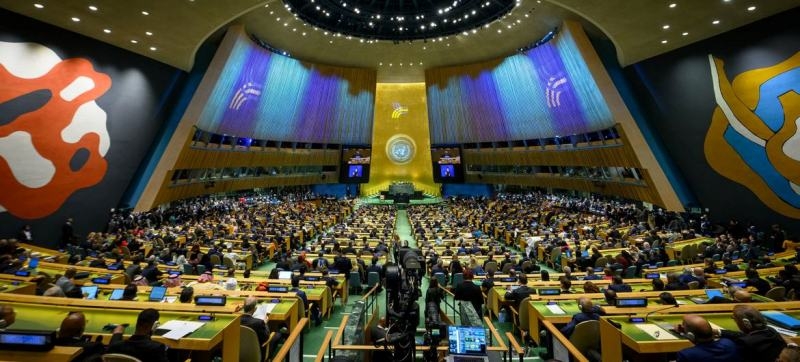- Bangladeshi leader of disabled people of world Dulal honoured |
- Dengue: 5 more die, 1,147 hospitalised in 24hrs |
- UN Report Warns Inequality Fuels Global Pandemic Vulnerability |
- Trump claims Russia, China secretly conduct underground nuclear tests |
- St Martin’s reopens, but no ships sail as overnight stays banned |
World leaders adopt pivotal UN Pact for the Future

A wide view of the General Assembly Hall during the opening of the Summit of the Future. UN Photo-Loey Felipe
22 September 2024 - World leaders are at UN Headquarters in New York this Sunday where they adopted the potentially game-changing Pact for the Future by consensus, with a small group of just seven countries holding out, having failed to pass a last-minute amendment. The centrepiece of the Summit of the Future is a once-in-a-generation opportunity to reimagine the multilateral system and steer humanity on a new course to meet existing commitments and solve long-term challenges.
World leaders on Sunday adopted the Pact for the Future, a landmark declaration pledging concrete actions towards a safer, more peaceful, sustainable and inclusive world for tomorrow’s generations.
The Pact along with its annexes, the Global Digital Compact and the Declaration on Future Generations, was adopted by consensus, despite a last-minute proposal for an amendment by some countries, including Russia, Iran, the Democratic People’s Republic of Korea (DPRK) and Syria.
The amendment sought to incorporate text calling for non-intervention in any issue of national sovereignty, and the primacy of intergovernmental deliberation, in effect, downplaying the role of the civil society or private sector interests. It was rejected after the 193-member Assembly decided not to act on the proposal.
Pact for the Future
The Pact’s five broad focus areas include: sustainable development; international peace and security; science and technology; youth and future generations and transforming global governance.
This has become an urgent pivot, as multilateral financial institutions and even the United Nations itself have come up short seeking solutions to 21st century problems, the pact lays out.
By endorsing the Pact, UN Member States pledged, among other things, to:
Turbocharge the Sustainable Development Goals (SDGs) and the Paris Agreement on climate change, two landmark 2015 agreements that have seen halting progress and missed milestones
Listen to young people and include them in decision-making, at the national and global levels
Build stronger partnerships with civil society, the private sector, local and regional authorities and more
Redouble efforts to build and sustain peaceful, inclusive and just societies and address the root causes of conflicts
Protect all civilians in armed conflict
Accelerate the implementation of our commitments on women, peace and security
Global Digital Compact
The Global Digital Compact marks the first truly worldwide agreement on the international regulation of artificial intelligence (AI) and is founded on the idea that technology should benefit everyone.
It outlines commitments to ensure that digital technologies contribute to sustainable development and human rights, while addressing risks like digital divides, cybersecurity, and misuse of technology.
The Compact aims to bridge the digital divide and ensure AI technologies are used responsibly, fostering global cooperation on both AI capabilities and security threats. Governments are also obligated to form an impartial worldwide Scientific Panel on AI and start an international conversation about AI governance inside the UN.
Declaration on Future Generations
The Declaration on Future Generations focuses on securing the well-being of future generations, also highlighting the need to include their interests in decision-making processes.
It also underlines the importance of protecting the environment, promoting intergenerational equity, and ensuring that long-term consequences of today's actions are considered.
New opportunities
Speaking after the adoption, Secretary-General António Guterres emphasized that the Pact for the Future and its annexes, “open pathways to new possibilities and opportunities.”
“People everywhere are hoping for a future of peace, dignity, and prosperity. They are crying out for global action to solve the climate crisis, tackle inequality, and address new and emerging risks that threaten everyone,” he said.
“They see the United Nations as essential to solving these challenges,” he continued, adding “the Summit of the Future sets a course for international cooperation that can meet their expectations … now, let’s get to work.”
Months of negotiation
The adoption was the culmination of months of negotiations co-facilitated by Germany and Namibia.
Speaking after the adoption, Philémon Yang, President of the 79th session of the General Assembly, urged nations to move forward, together, in a spirit of solidarity and multilateral cooperation.
“The path we choose must lead to a future where human dignity is respected and human rights are upheld. A future where peace transcends the mere absence of conflict and is grounded in justice, inclusion, and equity.” - UN News

